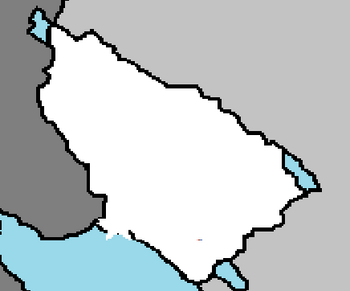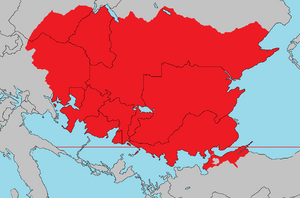Dominion of the Sanguine Church
Dominion of the Sanguine Church | |
|---|---|
|
Flag | |
 | |
| Capital | Seraph |
| Government | |
| Pontifex Maximus Stephanus Igennus III | |
| Population | |
• Estimate | 3,601,000 |
| Date format | mm-dd-yyyy |
| Driving side | right |
The Dominion of the Sanguine Church, also known as Sanguine or the DSC, is a landlocked country on the continent of Euronia, bordered by Murzi. It is a member state of the Coalition of Crown Albatross. It has a population of 3.6 million people, largely around the coast of Tangdrar Lake and the capital of Seraph. The Dominion of the Sanguine Church was a collection East-Euronian kingdoms in the middle ages, connected through a shared faith with the Sanguine religion. In the 1800's, the kingdoms largely combined into a federation, and quickly expanded into one of the largest nations and empires the world had ever seen. That expansion halted at the conclusion of the World War in 1954 and their defeat at the hands of the Allies (Zamastan, Avergnon, Ruskayn, Emmiria, and Vulkaria), who also uncovered and stopped barbaric acts of human atrocities such as the Aveirs Genocide. Since the World War, the Dominion's borders have shrunk considerably. The state has since remained isolated from global influence, becoming an authoritarian and tyrannical society often described as a hermit nation. Despite their isolation, harsh human rights records, and mandated state religion, they maintain their seat on the Coalition of Crown Albatross, albeit with strong misgivings from many member nations. Its modern-day economy is reliant mostly on cross-border trade from Murzi, though international sanctions have resulted in economic hardships for its population.

